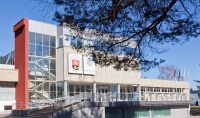Business School

22 Saulėtekio, LT-10225 Vilnius, Lithuania
Tel. 236 6889
E-mail:
Director – Dr. Birutė Miškinienė
STAFF
44 teachers (incl. 13 holding research degree).
RESEARCH INTERESTS
Entrepreneurship development, promotion and education
RESEARCH PROJECTS CARRIED OUT IN 2018
National Research Projects
Lithuanian Council for Culture. Strategy for the Development of the CCI of Utena Region and its Implementation Criteria (No. S/TYR-6(6.51)/2017 LSS-280000-443). Prof. J. Černevičiūtė. 2017–2018.
In order to carry out a pilot assessment of the changes in the cultural and creative industries of Utena City and Utena District municipalities and to identify current trends in the development of the cultural and creative industries in this region, the regional strategy papers, the results of their application (statistical indicators) have been investigated. As a result cooperation agreements have been signed between Vilnius University and Utena Business Information Centre and research report presented.
Baltic Sea Region Interreg project: Baltic Sea Underground Innovation Network. 2017–2020.
Partners: University of Oulu, Kerttu Saalasti Institute (Finland), Oulu University of Applied Sciences (Finland), University of Silesia in Katowice (Poland), Swedish Nuclear Fuel and
Waste Management Co (Sweden), KGHM Cuprum Research & Development Centre Ltd. (Poland), TU Bergakademia Freiberg Technical University (Germany), German Research Centre for Geosciences (Germany), Vilnius University (Lithuania), National Centre for Nuclear Research (Poland), Baltic Scientific Instruments (Latvia), Karelian Research Centre of Russian Academy of Sciences, Russian JSC Khlopin Radium Institute (Russia), Sotkamo Silver AB (Sweden), Tallinn University of Technology (Estonia)
The purpose of the project is to develop a service offering of Baltic Sea Region’s (BSR) underground laboratories (UL) in order to develop their capability to offer technology transfer utilizing the facilities and research infrastructures of the ULs for business development. Six underground laboratories are involved in the BSUIN project.
The main outcome of the project is a sustainable network organization, which will disseminate the technical, marketing, operational quality, training and other information about the BSR ULs created during the project. The web based tool and the network organization will be created so that they will provide an open innovation platform for further quality development and innovation and share the best practices for service concepts, facility improvement and methodology recommendations from piloting activities.
The expected results and outcomes of BSUIN project:
- Database consisting of the characterization data related to the Underground Labs in the Baltic Sea region.
- Web based tool that makes the database available.
- Baltic Sea region wide transnational network.
MAIN R&D&I (RESEARCH, DEVELOPMENT AND INNOVATION) PARTNERS
Higher Education Governance and Management, Helsinki University (Finland)
Oulu University of Applied Sciences (Finland)
Tallinn University of Technology (Estonia)
University of Oulu, Kerttu Saalasti Institute (Finland)
Rotterdam Business School (the Netherlands)
Advenio e-Academy (Malta)
Polytechnic Institute of Porto (Portugal)
Main publications:
Štangej, O. 2018. When being good is not enough: towards contextual education of business leadership ethics. Management; Management: Journal of Contemporary Management Issues, vol. 23, no. 2, p. 1–14.
Lezgovko, A. 2018. The effect of service clusters on the sustainable economic development. Economics and Culture, vol. 15(2), p. 75–84.
Kregždė, A., Kišonaitė, K. 2018. Co-movements of Lithuanian and Central European stocks markets across different time horizons: a wavelet approach. Ekonomika, vol. 97(2), p. 55–69.
Mikko, R., Mačiukaitė–Žvinienė, S., Tauginienė, L., Dikčius, V., Matschoss, K., Aarrevaara, T., Luciano d’Andrea. 2018. Public Participation, Science and Society: Tools for Dynamic and Responsible Governance of Research and Innovation. Oxford: Routledge, 152 p.